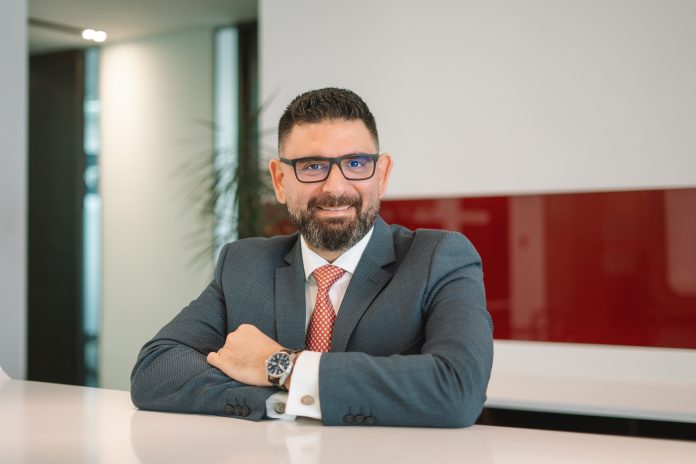Can you provide a brief overview of your professional background and experience in the banking and financial technology industry?
With a Bachelor’s Degree in Economics and a Master’s Degree in Global Banking and Finance, I began my banking career in the capital markets department, trading equities and fixed income for several banks. I eventually transitioned to the fintech industry in the United Arab Emirates, gaining experience with various vendors over more than a decade. These include Thomson Reuters FXall, FIS Sungard, MSCI, Bottomline TreasuryXpress, and Finastra.
What motivated you to join Backbase as the Regional Director for the Middle East?
My decision to join Backbase as the Regional Director for Business Development in the region was driven by multiple factors crucial for any successful journey. First and foremost, it was the prospect of having a brilliant and capable team that works together and operates harmoniously towards a common mission: revolutionising the digital space within the banks in the region. Secondly, Backbase offers a state-of-the-art platform that empowers banks to shift away from traditional banking built on legacy systems, which are typically costly to maintain, and instead empower them to focus on the customer and enhance the customer experience. Lastly, the region is in need of modernising banking and the shift from traditional banking is not just a must for financial institutions; it is one of the most critical factors for remaining relevant in a rapidly changing world. It involves harnessing the power of a new-generation digital banking platform for rapid innovation.
What are some of the biggest challenges of digital banking in this region?
Traditional banks are in an infinite struggle to modernise – but are they winning or losing?
Decades of different technologies and complex system integrations have created tangled webs of outdated, costly and disconnected systems that do not communicate, making it very difficult to meet the changing customer and business requirements. Core banking systems, continually burdened by a stream of ongoing change requests, have grown excessively bloated and complex.
Additionally, the channel solutions, which were initially developed in isolation, have evolved into costly silos that lack awareness of each other, resulting in a lack of synergy between them. Decomposing and modernising these disparate systems to create customer value has become a formidable challenge, as banks are stuck keeping the lights on rather than delivering actual value.
What’s Backbase strategy for growth and development for the coming years in the region, specifically UAE?
Banking in the Middle East is undergoing a digital transformation. Today, businesses are increasingly expecting faster, more streamlined and efficient solutions. And banks are evolving rapidly to support their customers’ growing needs – fine-tuning existing technologies, as well as exploring how to leverage new, innovative developments. We have observed a growing interest in digitisation within the banking sector in the GCC region and Backbase has been successful in acquiring new adopters to the engagement banking revolution. Banks in Saudi Arabia, Qatar, Bahrain and other areas in the Middle East have chosen Backbase as their digital partner of choice.
The UAE, being one of the most developed and forward-thinking countries in the region, is naturally a main focus for us moving forward. In the years to come, traditional banking will fall behind the curve, making way for digitisation and innovation. There is a significant paradigm shift towards a new operating model centered around customer engagement orchestration and the banks’ ability to create differentiating value propositions. This shift will further enhance the banks’ vision to capitalise on this change both locally and internationally.
Backbase plays a pivotal role in freeing banks from outdated legacy systems. Our white label platform allows banks to gradually replace or decompose disparate legacy systems, so they can build a modern journey orchestration architecture tailored to today’s customer preferences. These powerful yet incremental changes eventually add up to a significant transformation – streamlined journeys, eliminated silos and a customer-centric organisation. It is not a cookie-cutter transformation – we tailor our approach to match the unique pace and priorities of each bank. The end result is a digital transformation that is not just about tech, but about empowering both the customers and bank employees.
What do you think has the potential to be the next big thing in digital banking?
I see the next big thing in digital banking as Progressive Modernisation. It is about gradually replacing outdated systems, reshaping the core and building a modern digital banking architecture around customers and employees. The key here is leveraging industrialised and composable banking platforms such as Backbase that offer banks a flexible foundation for seamless experiences.
This omnichannel strategy allows banks to establish digital factories, swiftly creating business value, reducing technical debt and boosting ROI on IT investments. Ultimately, it is about fostering agile, customer-centric operations.
How does Backbase enable banks to modernise their digital banking infrastructure?
Backbase empowers both ‘progressive’ and ‘greenfield’ modernisation strategies, seamlessly integrating existing cores with a new, lean core. This approach focuses on creating business value incrementally, steering clear of large-scale disruptions for banks. Achieving successes early helps build confidence and momentum among technical teams. Moreover, by investing in a unified architecture, banks not only reduce technical debt significantly but also drive long-term platform synergies.












